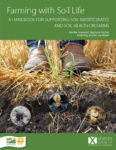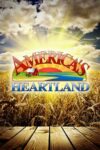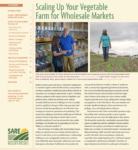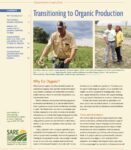Showing 21-30 of 94 results
New SARE Video: Ecological Weed Management at Terra Preta Farm
Understanding the biology of weeds is key to managing these troublesome pests using ecological principles. Cultural practices such as crop rotations and cover crops paired with smart cultivation have helped many farmers successfully manage weeds while reducing or eliminating herbicide use. In three new videos from SARE, Shakera and Juan Raygoza share their experience controlling […]

New Book: Farming With Soil Life: A Handbook for Supporting Soil Invertebrates and Soil Health on Farms
Smart farmers know that healthy soil hosts a flourishing and diverse ecosystem of bacteria, fungi and invertebrates. But the complex relationships between soil life, productivity and resilience are not well understood. Now available from the Xerces Society and SARE, Farming with Soil Life: A Handbook for Supporting Soil Invertebrates and Soil Health on Farms is […]
America's Heartland "Leaders in Sustainable Agriculture" Now Available on YouTube
SARE recently partnered with PBS KVIE to produce an episode of RFD-TV's America's Heartland featuring four farmers describing their commitment to sustainability, how they plan to overcome modern farming challenges, and how SARE has impacted their farming and ranching practices. The full 24-minute episode titled Leaders in Sustainable Agriculture is now available at https://www.sare.org/resources/leaders-in-sustainable-agriculture/. Watch: Videos featuring each […]

Leaders in Sustainable Agriculture Featured on America's Heartland
SARE partnered with PBS KVIE to produce an episode of RFD-TV's America's Heartland that features four farmers describing their commitment to sustainability, how they plan to meet farming challenges of today and tomorrow, and how SARE has impacted their farming and ranching practices. The full 24-minute video is available, as is each segment featuring the […]
RFD-TV Episode to Highlight Sustainable Innovations
Tune in to RFD-TV on March 29 at 5:30pm EDT for the premiere of a new “America’s Heartland” episode showcasing farmers and ranchers from across the country who are leaders in sustainability. SARE partnered with PBS KVIE to produce this episode, which features farmers describing their commitment to sustainability, how they plan to meet farming […]

Scaling Up Your Vegetable Farm for Wholesale Markets
SARE’s newest bulletin, Scaling Up Your Vegetable Farm for Wholesale Markets, provides a variety of strategies and tools to help owners of small- to mid-scale operations branch out into wholesale markets.

Manage Weeds on Your Farm Video Series
In this series, experienced farmers from around the country talk about how they have found success controlling weeds by following ecological principles, and without resorting to the use of herbicides. To do so, they rely on a range of cultural and mechanical practices, including diverse crop rotations, well-timed cultivation and targeting weeds when they're at […]

Transitioning to Organic Production
Transitioning to Organic Production lays out many promising conversion strategies, covering typical organic farming production practices, innovative marketing ideas and federal standards for certified organic crop production.

The Value of Farming with Community
Shakera and Juan Raygoza talk about why their bonds with local consumers, families, schools, agricultural educators and other farmers are beneficial for both them and for the community where they live and farm. They operate Terra Preta Farm on 15 acres in Edinburg, Texas, where they grow organic radishes for wholesale markets and run a […]

Scaling Up Your Vegetable Farm for Wholesale Markets
For direct market farmers, expanding your operation to capture local and regional wholesale markets can represent an opportunity. But such a shift brings with it many changes to how you run your farm because the expectations that wholesale buyers have is much different than your direct market customers. Scaling Up Your Vegetable Farm for Wholesale […]